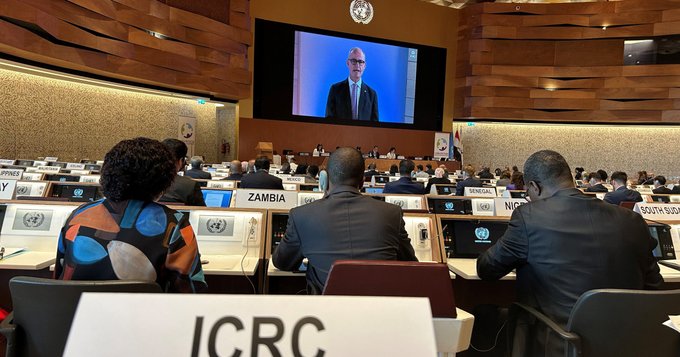Statement by ICRC Vice President Gilles Carbonnier at the 11th Meeting of States Parties to the Convention on Cluster Munitions
ARTICLE 19 SEPTEMBER 2023
Excellencies, Ladies and Gentlemen,
Since its entry into force, this Convention has protected countless civilians from the indiscriminate harm caused by cluster munitions.
These munitions kill, maim and cause widespread human suffering for years after conflicts end, if not decades. Cluster munitions block the return of displaced people to their homes. They hamper mobility, trade and agriculture. They shatter hopes and dreams over the long run.
Collectively – States, international organizations and civil society – we must all continue to spare no effort to promote universal adherence to the Convention and its norms. We call on all States that have not yet done so, to join the Convention without delay.
I warmly congratulate Nigeria for ratifying, and South Sudan for acceding to, the Convention, bringing the total number of States Parties to 112.
We see that the Convention helps consolidate a global norm against the use of cluster munitions. Yet, such munitions continue to be used in several States that are not party to the Convention. In the last few years, there have been multiple reports of their use in Libya, the Nagorno-Karabakh conflict, Syria, Ukraine and Yemen.
Some 1,200 casualties from cluster munitions were reported last year. The overwhelming majority of victims were civilians: According to the Cluster Munition Monitor 2023, civilians accounted for 95% of all recorded casualties in 2022. Children were once again disproportionately affected, making up over 70% of casualties where age was known.
Excellencies, ladies and gentlemen, this is a message I already conveyed one year ago, on behalf of the ICRC, at the opening of the 10th Meeting of States Parties to this Convention : any use of cluster munitions, anywhere, by anyone, must be condemned.
Today, we renew our call to all States and parties to armed conflicts to stop using, producing, transferring and stockpiling cluster munitions.
In addition to preventing the use of such munitions, effective responses to weapon contamination are equally crucial.
Due to their wide-area impact and high failure rates, the contamination caused by unexploded submunitions is far reaching. Clearance is slow and costly. What is needed to address contamination is a coordinated, well planned and adequately resourced humanitarian and development response.
We urge States to facilitate such life-saving responses, to provide access with the necessary legal and import permissions to bring in essential equipment, as well as ensure the security guarantees to enable the marking and clearance work.
Risk awareness and education for affected communities is another critical part of the response to cluster munition contamination. This has to be coupled with programmes that help reduce risks for communities in contaminated areas, supporting people’s livelihoods and enhancing economic security and social welfare.
Victims and affected communities should be placed at the heart of mine action. Survivors and their families will in many cases require assistance throughout their lives to recover and ensure full, equal and effective participation in society. This should be done with due regard to diversity amongst populations, including gender and age.
Long-term national response capacity thus needs to be strengthened. This includes exploring innovative ways to finance such responses.
Excellencies, Ladies and Gentlemen,
The ICRC remains firmly committed to assisting States in achieving the humanitarian goals of the Convention, both through law and policy, and through our work on the ground. For decades we have worked in countries like Afghanistan, Cambodia, Nigeria, Sudan and Yemen, where our prosthetics technicians and therapists have enabled thousands of women, men and children to regain their mobility and their dignity.
This year, alongside partners of the International Red Cross and Red Crescent Movement, we are providing technical and financial support to initiatives that address weapon contamination in more than 50 countries and territories.
Today, sadly, the level of cluster munition contamination in the world mean that our services will be needed for many years to come. For the sake of the victims of these weapons – past, present and future – we all have a responsibility to redouble our efforts to deliver on the goals of this Convention.



Comments